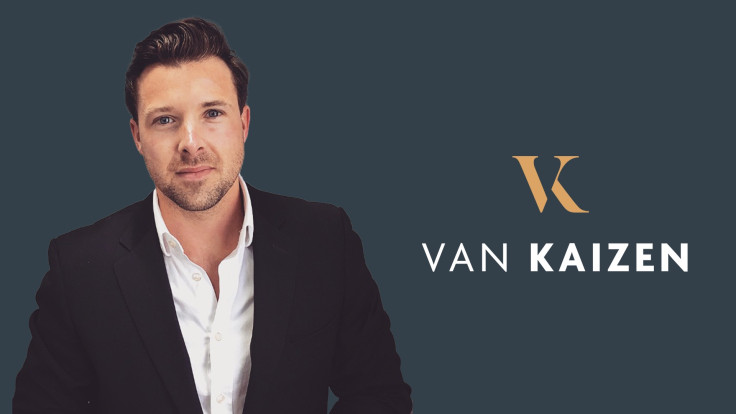Van Kaizen's Revolutionary Model Gives Recruiters the Power and the Paycheck They Deserve
With no salaries, no micromanagement, and total freedom over clients, Van Kaizen's high-commission model is attracting entrepreneurial recruiters

In a field long defined by rigid salaries, heavy oversight, and slim commissions, one company is rewriting the rulebook. Van Kaizen, founded just six years ago, has expanded to 30 recruiters operating across 16 countries and six continents, managing an impressive roster of around 400 clients. What makes it different isn't just global reach, it's a business model that's changing how recruitment works from the inside out.
Cosmo Currey, Head of Talent Acquisition at Van Kaizen, says the idea came from frustration with an unfair system.
'Recruitment around the world, whether in New York, London, or Paris, works in the same way: you're employed by a company, paid a base salary, and then given a commission,' Currey explained. 'The base salary is often not very high, and the commission is normally around 15%.'
The imbalance was clear. 'A recruiter might earn a £60,000–£80,000 base salary with bonuses, yet be invoicing £400,000–£600,000 for their company. That disparity is unsustainable,' he said.
Van Kaizen's answer was to borrow from an entirely different industry. 'It borrows from the US real estate model, think of overarching brands like Douglas Elliman or SERHANT. They provide invoicing, global credibility, marketing, legal, and back-office operations, while allowing realtors to work collaboratively under a high-commission model. Recruiters face the same challenges as realtors, so we applied that proven model to recruitment.'
The outcome has been transformative: Van Kaizen recruiters retain 75% of their billings, compared to the traditional 15% industry norm. Currey explained, 'That can slingshot a good recruiter from making under £100,000 to making three, four, five times that amount.'
The company's name reflects its philosophy. 'Continuous improvement, Kaizen, is a Japanese philosophy that's most powerful because it has no hierarchy. It applies equally to the janitor and the CEO. It removes ego and says: We are here to improve, how can we get better?' Currey shared.
That principle drives the firm's culture. 'We specifically look for individuals who are highly entrepreneurial, people who want to take control of their own destiny, but who also have the humility to recognise they can learn from others. Continuous improvement is foundational to who they are and how they think.'
But Van Kaizen isn't a fit for everyone. 'The kind of person who thrives at Van Kaizen isn't just entrepreneurial. It's someone who wants something better for themselves and their family, who realises they won't achieve that through the traditional employee setup in recruitment, but who also knows that going it alone will only take them so far,' Currey said.
Freedom is at the heart of Van Kaizen's structure. 'The freedom here is real: you can decide where in the world you work and choose the hours that suit you. For example, if someone wants to spend Friday afternoon at their child's football game, they can do that. No one is going to chase you or micromanage you. It's ultimate freedom, but underneath that, you must have hunger, grit, and discipline.'
And that mix is working. 'We've had an 87% retention rate among those who've joined, because the model truly allows people to earn more and live better. But it's also honest: you can make a lot of money, or you can make nothing. It's entirely down to the effort and dedication you put in.'
At the core of Van Kaizen's success is autonomy. 'The defining difference is absolute autonomy and freedom. No one follows up on you, no one chases you, you operate with complete independence, grounded in mutual respect for your colleagues,' Currey said.
And unlike most firms, recruiters own their work. 'If you leave, you can take all your clients and candidates with you. The contractual obligation is from Van Kaizen to the recruiter, not the other way around. These aren't Van Kaizen's clients; they belong to the recruiter. That in itself is almost unheard of in this industry.'
Behind that freedom is serious infrastructure. 'Our model is simple:75% of every invoice goes to the recruiter. The remaining 25% is entirely reinvested into the services we provide,' Currey explained. Those services include marketing, legal, finance, and operations, ensuring recruiters have the tools to succeed. 'At any time, a recruiter can call a director and ask for help, whether it's legal language in a client contract, advice on marketing, or support with operations. And they'll get an answer quickly, often within hours, from someone who is a true specialist in that area.'
Still, it's not a model for the faint of heart. 'Out of 100 people we speak to, maybe 10 will say, 'This is amazing, I want in.' The other 90 will say, 'No way.' That's the reality of a model based on very high commission and no salary,' Currey admitted.
For those who do take the leap, the rewards can be immense. 'Van Kaizen can be both the greatest and the hardest place you'll ever work. You could sit at home watching Netflix every day, no one will call you about it, but you won't earn anything either. This is for people with a natural drive, those who hear 'no' and think, maybe I can turn that into a yes.'
To anyone still hesitating, Currey has a simple challenge. 'Don't just listen to me. Look at your own numbers. Take your billings over the last three to five years and ask yourself: if you had kept 75% of those, what would your life look like today? That's the reality of our model.'
Looking ahead, Van Kaizen is focused on scaling through innovation. 'We know AI can take over much of the administrative burden, finance, invoicing, legal, marketing support, even scheduling interviews. These are essential but time-consuming tasks, and if we can remove them, recruiters can focus on what matters most: candidates and clients.'
Their goal is bold but clear: from 30 recruiters to hundreds. 'A network of 30 recruiters is good; a network of 300 is extraordinary. We want Van Kaizen to be a business where people are shouting from the rooftops, "This is the future of recruitment.'"
At Van Kaizen, the message is clear: freedom, autonomy, and unlimited earning potential come with responsibility. 'The biggest misconception is that people think it's easy. It's not, it's hard, really hard,' Currey said. But for those who thrive on challenge and independence, the reward goes beyond financial success. 'Safety, freedom, and the chance to earn what you deserve, those are the things that make people stay.'
© Copyright IBTimes 2025. All rights reserved.





















